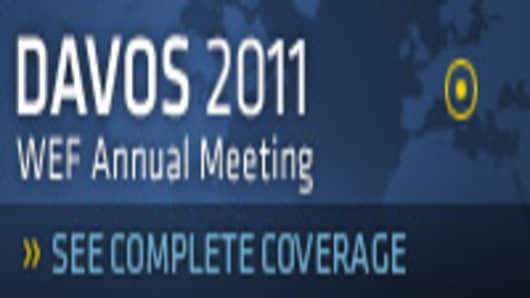Political and business leaders invited to the World Economic Forum's annual meeting in Davos this week will sift through the blessings and curses of global interdependence that not only brought the world’s economiesto a collective low three years ago but also provide the only realistic return to prosperity.
Economic growth has resumed in much of the world, but recovery has been slight and fragile.
"The world is no position to face major, new shocks," concluded the World Economic Forum’s annual risk survey. "The financial crisis has reduced global economic resilience, while increasing geo-political tension and heightened social concerns suggest that both governments and societies are less able than ever to cope with global challenges.”
The report, meant to set the table for Davos’ attendees, set an ominous tone underscored by WEF founder Klaus Schwab.
“We should not look to old-world recipes, since unfettered capitalism and state-directed collectivism have both been bankrupted as guiding ideologies,” he sais in a recent media briefing. “Our only way out is the stakeholder concept. The pursuit of our own interests can only be substantially realized by incorporating the interests of all those with whom we have a mutually dependent relationship.”
Two Sides Of Globalization
Over the past 50 years, the global exchange of information, goods, services, capital, technology, ideas and people has fostered a rise in standards of living throughout much of the world.
Yet, as the editors of a new book, "The Dark Side of Globalization," point out, “The growth in transnational flows has not been matched by an equivalent growth in global governance mechanisms to regulate them.”
Jorge Heine & Ramesh Thakur, two political science professors from the University of Waterloo, Ontario, write, “The notion that endless liberalization, deregulation and relaxation of capital and all border controls (except labor) will assure perpetual self-sustaining growth and prosperity has proven to be delusional."
The new year finds the European Union still mired in its first major test—stronger members like Germany and France propping up debt-heavy ones like Greece, Ireland and Portugal.
“The EU has a monetary union but not a fiscal or regulatory union,” says Jamie Metzl, executive vice president of the Asia Society. “That puts pressure on countries like Germany that have to bear enormous responsibility for the well-being of the whole union. It’s going to cause enormous problems since there are such diverse regulatory environments.”
Push Vs. Pull
As French President Nicolas Sarkozy observed: "We can't share the same currency and have different economic strategies."
China, India and other emerging countries struggle to restrain inflation that is driving up the cost of goods and labor in ways that threaten their reputations as low-cost havens.
In November, China posted a 5.1-percent annual gain in its consumer price index, the largest in more than two years. Defensive measures brought it down to 4.6 percent in December.
The United States and China accuse each other of engaging in currency wars that threaten to undermine the cooperation needed for global recovery.
And while engineering its own economic recovery, the U.S. continues to increase its deficit while largely ignoring calls to cut spending.
“The bond crises we’ve seen in Greece and Ireland may not be unique to them,” says Metzl, a National Security Council staffer in the Clinton Administration. “If the U.S. continues to amass debt like we have, we’ll have a bond crisis here. It may not be the same, but it won’t be entirely different.”
The current global order is built around the notion that some countries will be consumers and some will be producers, said Armagan Gezici, a Turkish-born economics professor at Keene State College in New Hampshire.
“This order is fed by an increasingly fragile global financial order,” she says. “Countries that can still export and generate exports revenues seem to emerge as strong ones, while the economies of the others have been struggling. The latter group now includes the U.S. and the U.K., which have not been known as the weak countries in the world.”
Signs Of Teamwork
Such countries should accept that they cannot go on living on debt forever, adds Gezici, “especially if the debt creation is completely left into unregulated hands of a global financial industry. Finance capital is a too dangerous of a beast to be the engine of long-term, stable growth.”
The Davos risk survey refers to “the threat of a new economic crisis, which could arise from the tension between the increasing power and wealth of emerging economies and the high levels of debt in the west.”
Teamwork Emerges
Despite continued economic turmoil, various frameworks for global governance continue to grapple with its causes, as evidence of global teamwork emerges.
In recent weeks, Japan pledged to buy 20 percent of the EU bonds that will be issued soon to support Ireland. Also this month, China agreed to buy debt from Spain, the EU’s fourth-largest economy, after agreeing last year to buy bonds issued by Greece.
Earlier this month, banking regulators representing 27 of the world’s largest economies agreed to raise worldwide capital requirements whenever a country declares its economy is overheated.
Members of The Basel Committee on Banking Supervision voted to require banks within the country to hold extra capital to protect against potential losses, and other countries with exposure to the “bubble country” would follow suit.
“This is very significant, because it takes the regulatory community into protecting the health of the entire system rather than just individual banks,” said Paul Tucker, deputy governor of the Bank of England.
“They’ve crossed a Rubicon,” says Barbara Matthews, a U.S.-based regulatory consultant. “Up until now the Basel committee has been about making banks safe. They are now implementing a tool kit that blurs the line between regulation and economic policy.”
G-20 Steps Up, Falls Down
In 2009, the so-called G-20, which is made up of countries that represent 85 percent of the world’s economies, agreed in at its meeting in Pittsburgh to become the new permanent council for international economic cooperation, replacing the smaller G8.
“At the outset of the global financial crisis, measures taken appeared ad hoc or temporary,” says Gezici. “But the decision at the Pittsburgh Summit in September 2009 to institutionalize the Group of 20 reflects a marked shift in the locus of leadership.”
The G-20 adopted a proposal from President Obama that outlined a process for economic cooperation to help ensure that worldwide recovery is sustained. It’s the first time such a large number of countries agreed to work together on each others’ economies, regulatory reforms and future growth.
But the group’s subsequent meeting last November in Korea stalled, failing to capitalize on earlier progress as members disagreed on how to best foster global growth.
“Korea showed that the G20 goal of strong, sustainable and balanced growth is nothing but a mantra with few follow-through policies,” says Gezici. “The underlying problem is that it is impossible to force nations to agree when they have irreconcilable differences over their global economics analysis and policy prescriptions.”
Davos founder Schwab said this year, “the G20 will have to demonstrate that it can address not only the necessary financial reforms but also questions of global governance, the reform of the global monetary system and the scarcity and fair distribution of natural resources.”
An individual nation’s economic troubles now ripple across world markets in hours, even minutes yet global solutions remain elusive and nearly impossible to implement.
“We are entering uncharted waters,” says Metzl. “American debt is a big challenge, as is the overheating of the Chinese economy and the growing debt crisis in the European Union. We have lived in a U.S.-led, rules-based economy for some seven decades, and something new is now emerging. In a post-American world, no one knows yet what the rules are or appreciates the dangers.”



